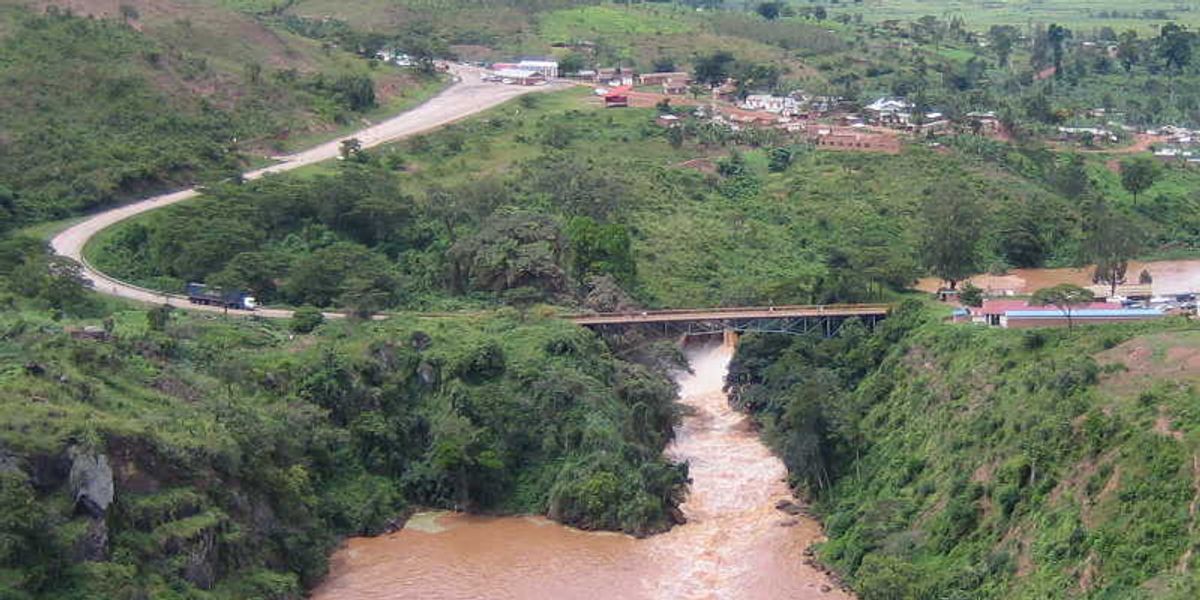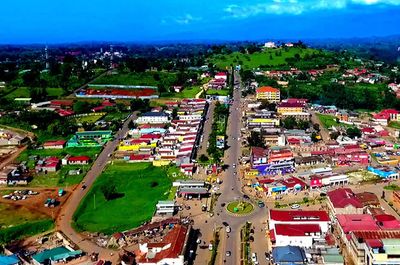

River Kagera near the point where the run-of-the-river dam will be built. The river will change the lives of over a million people in three countries thanks to cooperation under the NBI. Photo Credit: Internet
Last Thursday March 30, 2017 was a historic day in relations between the ten countries that form the Nile basin.
Construction of an 80MW hydro-power dam was flagged off at Rusumo falls located at a common border between
Tanzania-Rwanda and about 20KM from Burundi on the Kagera river. When completed, the dam will connect more than a million energy-strapped communities in Tanzania, Rwanda and Burundi.
Although conceived as far back as the 1970s, the Regional Rusumo hydropower project’s progress was hampered by the collapse of the Kagera Basin Organisation (KBO).
Revived in 2006 by the Nile Basin Initiative (NBI), the commencement of the project’s construction has been hailed as a historic moment in the management of trans-boundary water resources especially between countries that share the Nile basin. The successful launch of the project was also hailed as one of the fruits of the NBI as an agency that clinched the project through coordinating the member countries to clinch a project hitherto inconceivable because of its geopolitical as well as financial sensitiveness.
The NBI secretariat perhaps rightly observed in a statement preceding the kick-off of the dam’s construction thus: “Although the three partner states discussed over several years to move Rusumo falls project forward, implementation of the highly needed project was not forthcoming due to a number of reasons. These included among other; lack of commitment from the partner states, lack of investment finance, civil conflict as well as absence of a joint institution to coordinate the project.”
But the unsaid truth and perhaps more critical to the success of the project was the absence, previously of a regional body that would prepare for development of the project by laying the ground work for the political, financial, social aspects required to achieve such as mega project.
When finished, each of the three beneficiary countries will equitably share the power generated from the dam hence ensuring that each state takes an estimated 27MW of renewable power at full production. Besides, the project will enable the three beneficiary countries and communities to tap into the region’s expanding electricity pool thanks to interconnection projects.
The successful kick-off of Rusumo hydro-power dam, marks a watershed moment in the history of cooperation by Nile Basin member countries. The Nile Basin, a region of ten countries that share the longest river in the world, remains one of the poorest in the world despite the huge resources and enormous development potential that the rive holds.
Besides political conflict that has dogged most of the member countries for the past five decades, disputes, or perhaps the fear of avoiding disputes, arising from colonial era agreements have been cited as some of the obstacles that have stood in the way of countries to undertake major development projects that could spur growth and development in the member countries.
The project demonstrates that with cooperation, seemingly impossible projects, because of their financial and geopolitical sensitiveness, can be achieved through cooperation.
The project comes at a time when member countries in the Nile Basin are aggressively promoting the need to adopt the Cooperative Framework Agreement (CFA) signed in 2010 in Entebbe, Uganda to replace colonial-era agreements signed by the British and only two of the Nile basin countries.
Many supporters of the CFA, are keen to point to Rusumo, even in its infancy, as an outstanding example of success that comes from the cooperative utilization of resources with a trans-boundary nature as the Nile. More critical perhaps, is that Rusumo’s success, it is hoped will act as a glue that will bind the three countries together in a harmonious bond as each of them tries to avoid conflict by ensuring continuity of the project and benefits to its respective populations.
As Colin Bruce, the World Bank’s Africa region Director for Strategy, Operations and Regional Integration observed before the dam’s construction; “By connecting grids, people and environmentally sensitive solutions, the project will help to catalyze growth and to encourage peace and stability in the sub-region.”
Construction of the Power Generation Plant is financed by the World Bank at a cost of USD 340 million while the transmission lines that will connect the power plant to the national grids in the three countries is financed by the African Development Bank (AfDB) at a cost of USD 121 million.
Perhaps more importantly, as the NBI notes, the Rusumo hydro power project, which is just one of the 30 projects under consideration across the ten-country Nile Basin, demonstrate the potential benefits of cooperation among member countries in the management of water resources.
Besides providing a reliable source of renewable energy to nearly a million energy-strapped people surrounding Rusumo area, it is hopped that the dam’s successful completion will come with numerous attendant benefits such as increased job creation, environmental conservation, better living standards more so for women and children that rely mostly on wood fuel for cooking and the backward carbon-monoxide emitting kerosene lanterns for lighting.
With a better source of light, it is further hoped that children’s education opportunities will be raised.
How it was achieved
The three beneficiary countries jointly mandated Nile Equatorial Lakes Subsidiary Action Program Coordination Unit (NELSAP-CU), the investment arm of the NBI, to coordinate the development of studies and later the implementation of the Rusumo Falls Hydropower project.
The commencement of the project goes a long way in the realisation of the NBI’s principles outlined in the Cooperative Framework Agreement (CFA) of a harmonious, equitable and reasonable conservation, management and development of the Nile River Basin and its waters.
The CFA, which has been signed by six of the ten member Nile Basin countries, seeks to replace the rights-based colonial era agreements to a collaborative approach in the utilization of the Nile resources.
The cooperative framework seeks to replace the rights-based colonial era agreements of 1929 and 1959 that gave exclusive rights to Egypt and Sudan over the waters of the Nile. The rights-based approach pushed countries to pursue unilateral and conflicting approaches to the utilisation of shared water resources that bred constant squabbles between upstream and downstream countries particularly Egypt.













Henry Lutaaya
Leave a Comment
Your email address will not be published.